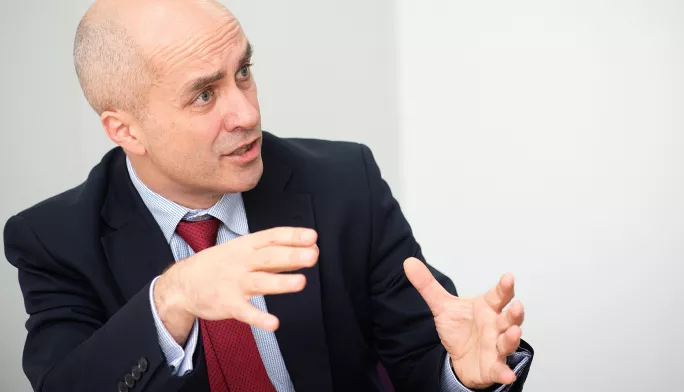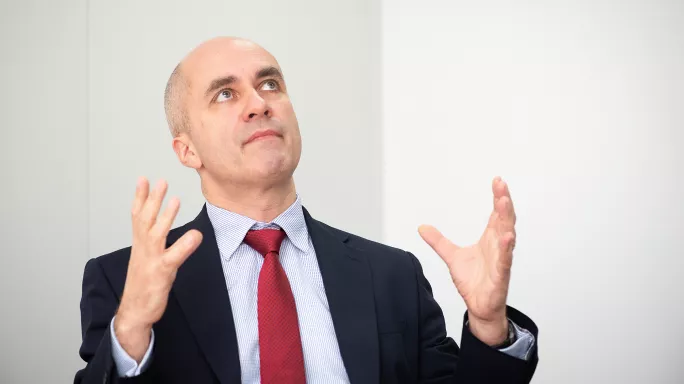
- Home
- Meet the man at the top of the academy tree
Meet the man at the top of the academy tree

Academies have not had a great press recently.
Amid stories about failed MATs, soaring salaries and conflicts of interest, the DfE has struggled to get across its messages about its flagship schools policy.
But now, the sector has a new figure at its helm, and he intends to shout about its successes.
“I want to celebrate more – not in a glitzy marketing way – just what’s good,” says Dominic Herrington, who became interim national schools commissioner (NSC) in September.
It is a role that puts him at the top of the system that oversees the more-than 8,000 academies that educate about half of the children in England’s state funded schools.
“I was in an academy a couple of weeks ago in Croydon,” the civil servant says. “Just a really small junior school that had been in special measures but became an academy and is now a good school, and that leader wouldn’t put her head above the parapet. But she’s changed children’s lives.
“Those are the people that I want to exemplify and bring their experiences into these conversations about multi-academy trusts.”
For him, the high-profile negative stories that have hit the headlines are a “small minority of cases” which the DfE has dealt with “really quickly”.
Big shoes to fill
Herrington’s predecessor as national schools commissioner was Sir David Carter – a loud and influential voice on England’s education scene.
He was a seemingly ever-present figure at education gatherings, outlining his carefully delineated thoughts on issues across a wide spectrum of England’s school landscape.
At times, it felt as if he was straining for a leadership role that extended much further than the formal remit of a national schools commissioner might suggest.
Herrington does not say it explicitly, but seems to indicate that his voice will range less widely.

He praises Sir David’s “fantastic job in terms of motoring forward with MATs, and the promotion of MATs”. But the new NSC says that while he will “keep going with some of the external work”, there will be “more of more of an internal focus as well”.
When Carter addressed educationalists, he spoke from years of personal experience as a teacher and school leader.
By contrast, Herrington's DfE biography suggests that although he taught English as a foreign language in Spain, he - like Ofsted chief inspector Amanda Spielman - has not taught in schools in England. The DfE did not dispel this impression despite being several opportunities to do so.
However, Herrington has previously held positions in universities and the DfE, and has experience as a school governor.
Making our work 'as efficient as it needs to be'
In his new role, he oversees the network of eight regional schools commissioners (RSCs) across England, and the headteacher boards (HTBs) that advise them.
These are powerful positions, deciding which schools become academies, who runs them, and what happens to them when things go wrong.
And it is a job that Herrington knows well, having been one of the original eight RSCs appointed in 2014, covering the South-East England and South London region. Today, he retains oversight of this patch alongside his national position.
Although the DfE will only say that more details on his status as “interim” NSC will be announced “in due course”, many in the sector expect Herrington to keep the job on a permanent basis. He certainly doesn't talk like a man who is only there for the short term.
In this, his first big set-piece interview since taking on the role, he is slick, confident and well-briefed, closely following the lines of his ministerial bosses, and needing little help from the two DfE press officers sent to accompany him.
When asked about his priorities, the RSC system is first on his list. He says he wants “an unashamedly operational focus on making the RSC system, which is bedded in now, work really, really well”.
Since the system was created, the resources going into it have risen sharply. Many have contrasted this to the fate of Ofsted, which has seen its funding steadily eroded over the same period.
But today, Herrington emphasises the need for efficiency.
“My job is to support and challenge [the RSCs], to advise, coach, mentor them, to be going around the country, getting alongside them and working with their teams and making sure that our operation – if you like, our work – is as tight, efficient, consistent as it needs to be.”
The venue for the interview certainly has no frills.
In contrast to his ministerial bosses, who meet journalists in their spacious offices on the seventh floor of the Sanctuary Buildings, the DfE’s Westminster headquarters, the national schools commissioner greets Tes in a small, spartan meeting room off a corridor on the third floor.
His support for transparency – the lack of which has damaged confidence in the RSC system – crops up more than once in the conversation.
It is an idea that may be starting to take root in the DfE, with education secretary Damian Hinds promising greater openness in how the RSCs operate last May.
Now, Herrington’s HTB has become the first to publish more detailed minutes of its discussions, and December was the first month for which all HTBs published draft agendas ahead of their meetings.
Telling the DfE what's happening on the ground
Herrington has other priorities, too.
One is “refining our oversight, making our risk management tighter, working with the Education and Skills Funding Agency, deepening and strengthening all of those links”.
This sounds like a tacit acknowledgement that some of the academy scandals have been more than isolated one offs, but reflect wider systemic problems. But Herrington says he doesn’t think he is addressing “a fundamental set of problems in our operation”.
“I suppose the way I have come at it is there’s a lot of perception out there and uncertainty about, at times, how headteacher boards have operated,” he says.
“I’m interested in understanding why that feedback has come in. If people have that perception I want to respond to that and assure myself that the boards are working well. I think, from my observations so far, they are.”

His other priorities involve improving communication between the different players in the system, which he hopes will contribute to his goal of creating “great MATs”.
“One of my roles is to ensure that they are sharing what they are doing with one another. We have national work going on in that area. There is work going on in the regions. It’s really, really important that that happens.”
Such information sharing is also something that the Sutton Trust called for in a report issued just before Christmas, to ensure that the majority of academy chains where disadvantaged pupils perform below the national average can learn from the minority where they do better.
Another aim of Herrington's is to become a conduit between those sitting in Sanctuary Buildings who set policy, and those on the ground who implement it and are affected by it.
“We have regional teams, regional commissioners,” he says. “They know a lot about what is going on out there in the system. Bringing that back to the policy-making centre and helping with that policy making and ultimately giving advice to ministers, that’s a really important part of the role.”
'Not going soft on failure at all'
Herrington took over the NSC role at a time of great change for the regional schools commissioner system that he now leads. Some would go further, and describe it as a system in retreat.
Earlier in the year, Ofsted won its tussle with the RSCs about who inspects schools. The latter had been accused of running a ‘shadow inspection’ regime, which saw their advisors duplicate the work of Ofsted by visiting under-performing schools, judging their performance and issuing recommendations for improvements.
In May, Hinds clipped the wings of the RSCs by making it clear that now only Ofsted would inspect schools.
There are whispers in Whitehall that academies minister Lord Agnew had invaded a central part of the NSC's territory with his hands-on dealings with individual multi-academy trusts, and that this was a factor in Sir David Carter's departure.
The DfE has also stripped RSCs of their power to force schools to become academies.
Where once they could order schools that were ‘coasting’ or below the floor standard to convert, now they can only give them an offer of support. Compulsory conversion is now restricted to schools rated “inadequate” by Ofsted.
It is a notable about-turn from a government that had, since 2010, doggedly preached academisation as the key to school improvement. So does Herrington think this has deprived RSCs of a key tool to drive up standards?
“No, I don’t,” he says. “Because I think if you look at the 95 per cent of the schools that become academies, they do it out of choice so it’s a positive, professional choice for those heads and those governors.”
But does replacing the hard-edge of compulsion with a much softer offer of support mean the government is, in its own terms, going soft on failure? Again, Herrington demurs.
“I don’t think we are going soft on failure at all,” he responds. Instead, he says that “we ultimately have to respect the professional judgement of headteachers and governors”.
Money, money, money
From his vantage point at the top of academy tree, what does Herrington see as the main challenges facing the sector?
“I don’t think there are specific academy challenges,” he says. “I think there are challenges that face all schools and we need to be working on all of them.”
Perhaps unavoidably, money comes up, but like the ministers he reports to, he frames this around finding savings in existing budgets, rather than a need for new money.
“One of the challenges in the academy sector is the challenge that all schools face, which is around the efficiency challenge,” is how he puts it.
It is an area where Herrington has already caused controversy.

His assertion that the school system is not even on the verge of a funding crisis – although he acknowledged a “big challenge” – was variously met with charges of “insouciance”, being a “remote and poorly judged denial”, and betraying “a lack of deep understanding”.
The other challenge for the academy system that Herrington raises is, “in pockets of the country, teacher recruitment and retention, which is a challenge in the sector more broadly”.
In this he is closely echoing the line taken by his ultimate boss, Damian Hinds, who has made recruitment and retention an overriding DfE priority.
DfE is 'all over' academy pay
But then there are those other challenges facing that the academy sector that have hit the headlines, and which Herrington does not raise: CEO pay, the ‘untouchable’ schools, and the disconnection between some academies and the communities they serve.
On the academy leaders who are paid six-figure salaries, Herrington says he is “absolutely behind 100 per cent” the increasing scrutiny that Lord Agnew and the Education and Skills Funding Agency are putting them under.
“We have an efficiency challenge across the school sector and it’s absolutely right that we look really hard at CEO pay”, he says.
“I mean obviously a fair day’s work for a fair day’s pay, but we are all over that. I believe that really strongly.
"We are public servants. We have a tremendous opportunity to help the next generation of children, and we need to be very, very conscious of that.”
But when it comes to the academy system’s biggest pay packet – the more than £500,000 that Sir Dan Moynihan receives in salary and pension contributions as leader of the Harris Federation in London – Herrington is more circumspect.
While he says he does not want to comment on individuals, the noises he makes about Sir Dan sound supportive.
“Harris has an outstanding record in terms of school performance across some of the most challenging schools in the capital, so you cannot get away from some of the strengths there,” he says.
'I don’t think it needs me to instruct'
The recent high-profile failures of academy trusts such as Bright Tribe and Wakefield City Academies Trust have highlighted worries that the connection between schools and their surrounding communities can be severed when they join larger organisations.
It is a problem that Herrington plays down.
“I think there may have been one or two minority cases where trusts could have done more but I don’t think it’s a system-wide problem,” he says.
“The rules are there. Most MATs understand their localities and communities and most of them have come from being schools in those communities, so I don’t think it needs me to instruct.
“The rules are already there, and I would support any transparency in the sector, in the way that we are very transparent about academy finances we can be transparent about what’s going on.”
A key point, for him, is that although the problems with some bigger MATs have hit the headlines, such big players are not the norm.
“Most of them are between one and five schools, are rooted in their communities or their areas, and so that takes care of everyone knowing who the school is or who the trust is.”
The schools that no-one wants
And on an issue that goes to the heart of the moral purpose of the academy movement, Herrington indicates that he will take a case-by-case approach, rather than introduce a sweeping new strategy.
It centres on what are sometimes called the ‘untouchable schools’, or the SNOWs – schools no-one wants.
They are the schools that are most in need of help, because of a range of issues than can include poor results, financial crises and crumbling buildings.
And although they are the sort of schools that the academy movement was originally founded to help, the problem now is that many academy trusts are too risk adverse to take them on.
Again, Herrington’s first response is to contextualise the problem, saying “the number of those schools is really small in the system”, although “every case deserves our absolute attention”.
His solution is not the extra DfE funding that figures such as Sir Steve Lancashire, the CEO of the biggest primary-only trust Reach2, has called for. “Money is tight across the sector”, Herrington says.
Instead, he suggests an intensive focus on the problems facing each individual school, and Herrington pledges that he will get personally involved in the details.
“Fortunately the numbers are relatively small, so myself and the regional teams can go through them and see are there things we can do.
“One of our jobs is to make sure that we are working very closely and intensively with the local authority to try and unblock any issues that might be affecting conversions.
“In my role I will be getting involved in some of those cases in order to give those schools the sense of direction in the future that they want.”
And Herrington's success in dealing with these hardest of cases will be a key test of how his time in the role is judged.
CV highlights
TEFL teacher in Spain
Worked at Warwick and Birmingham Universities
2006-2010: Deputy director at the DfE
2010-present: Vice chair of governors, Goodrich Primary School
2010: Principal consultant, Capgemini consulting
2010-2014: Director, DfE
2014-present: Regional schools commissioner for South East England and South London
2018-present: Interim national schools commissioner
Register with Tes and you can read five free articles every month, plus you'll have access to our range of award-winning newsletters.
Keep reading for just £4.90 per month
You've reached your limit of free articles this month. Subscribe for £4.90 per month for three months and get:
- Unlimited access to all Tes magazine content
- Exclusive subscriber-only stories
- Award-winning email newsletters
You've reached your limit of free articles this month. Subscribe for £4.90 per month for three months and get:
- Unlimited access to all Tes magazine content
- Exclusive subscriber-only stories
- Award-winning email newsletters



